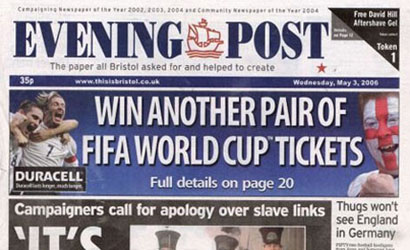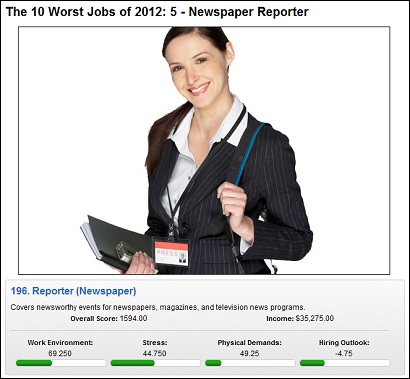 Journalisted is an independent, not-for-profit website built to make it easier for you, the public, to find out more about journalists and what they write about. It is run by the Media Standards Trust, a registered charity set up to foster high standards in news on behalf of the public, and funded by donations from charitable foundations. Each week Journalisted produces a summary of the most covered news stories, most active journalists and those topics falling off the news agenda, using its database of UK journalists and news sources.
Journalisted is an independent, not-for-profit website built to make it easier for you, the public, to find out more about journalists and what they write about. It is run by the Media Standards Trust, a registered charity set up to foster high standards in news on behalf of the public, and funded by donations from charitable foundations. Each week Journalisted produces a summary of the most covered news stories, most active journalists and those topics falling off the news agenda, using its database of UK journalists and news sources.
Balotelli, hosepipes and the Falklands
For the week ending Sunday 8 April
- Mario Balotelli’s on and off field behaviour drew the attention of the media
- A hosepipe ban in the South East, 30th anniversary since the start of the Falklands war, and the London Mayor electoral campaign covered quite a lot
- Amazon escaping a large corporation tax bill, increasing unease in Greece over austerity plans, and the UK just escaped recession last quarter covered little
Covered Lots
Covered Little
Political ups and downs (top ten by number of articles)
- David Cameron, 388 articles (+37% on last week)
- George Osborne, 184 articles (-52% on last week)
- Nick Clegg, 152 articles (+58% on last week)
- Boris Johnson, 140 articles (+37% on last week)
- Ed Miliband, 125 articles (-60% on last week)
- Brian Paddick, 120 articles (+823% on last week)
- Ken Livingstone, 117 articles (+65% on last week)
- Theresa May, 109 articles (+47 on last week)
- Michael Gove, 94 articles (+124% on last week)
- George Galloway, 91 articles (-28% on last week)
Celebrity vs Serious
Eurozone leaders (top ten by number of articles)
- Nicolas Sarkozy (France), 76 articles (-26% on last week)
- Mario Monti (Italy), 28 articles (+40% on last week)
- Angela Merkel (Germany), 26 articles (-43% on last week)
- Mariano Rajoy (Spain), 15 articles (-65% on last week)
- Lucas Papademos (Greece), 7 articles (-22% on last week)
- Enda Kenny (Ireland), 5 articles (-58% on last week)
- Jean-Claude Juncker (Luxembourg), 2 articles (-75% on last week)
- Mark Rutte (The Netherlands), 2 articles (no change from last week)
- Jyrki Katainen (Finland), 1 article (-50% from last week)
- Pedro Passos Coelho (Portugal), 1 article (from 0 last week)
No other Eurozone leaders were mentioned in UK press coverage.
Who wrote a lot about…the London Mayoral election campaign
Long form journalism
Journalists who have updated their profile
Andrew Purvis is a journalist for The Daily Telegraph, whilst also being a managing editor at Ultratravel. He has previously worked for The Guardian, Observer – where he was editor of the magazine ‘Life’ – and was section editor at the Independent on Sunday Review.
Kate Ross is a freelance journalist who writes for the International Herald Tribune, the New York Times Global edition, AnyTrip and numerous others. She completed her Masters in Print and Online Journalism from the University of Westminster in 2010. Follow her on twitter @myeagereyes
The Media Standards Trust, which runs journalisted, won the ‘One to Watch’ category at this year’s Prospect Think Tank Awards
Read about our campaign for the full exposure of phone hacking and other illegal forms of intrusion at the Hacked Off website
Visit the Media Standards Trust’s Churnalism.com – a public service for distinguishing journalism from churnalism
The Media Standards Trust’s unofficial database of PCC complaints is available for browsing at www.complaints.pccwatch.co.uk
For the latest instalment of Tobias Grubbe, journalisted’s 18th century jobbing journalist, go to journalisted.com/tobias-grubbe








